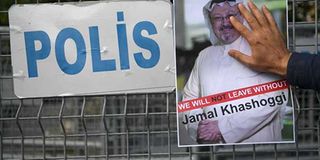US bars entry to 16 Saudis over Khashoggi killing

A protestor holds a picture of missing journalist Jamal Khashoggi in front of the Saudi consulate in Istanbul on October 5, 2018. US State Department Monday barred entry to 16 Saudi nationals over what it described as their role in the murder of Khashoggi. PHOTO | OZAN KOSE | AFP
What you need to know:
- Dissident writer Khashoggi was killed and dismembered October 2 in the Saudi consulate in Istanbul.
- Trump has instead emphasised that Riyadh is a major arms importer for the United States and an important regional ally against Iran.
- Republicans and Democrats alike have bristled over the White House's apparent embrace of the kingdom and its leadership.
Washington
The US State Department Monday barred entry to 16 Saudi nationals over what it described as their role in the murder of journalist Jamal Khashoggi as the administration of Donald Trump continues to face harsh criticism over its handling of the affair.
Dissident writer Khashoggi was killed and dismembered October 2 in the Saudi consulate in Istanbul by a team of 15 agents sent from Riyadh, sparking unprecedented international scrutiny of the kingdom's human rights record.
CROWN PRINCE
But despite the fact that Saudi Arabia's powerful crown prince Mohammed bin Salman was named as "responsible" for the murder by the US Senate, who adopted their resolution after being briefed by the CIA, the US president has refused to publicly take a stand against the country's de facto ruler.
Trump has instead emphasised that Riyadh is a major arms importer for the United States and an important regional ally against Iran.
A statement by the State Department listed the 16 individuals and said that they had been designated under the Department of State, Foreign Operations, and Related Programme Appropriations Act.
The section in question "provides that, in cases where the Secretary of State has credible information that officials of foreign governments have been involved in significant corruption or gross violations of human rights, those individuals and their immediate family members are ineligible for entry into the United States.
"The law requires the Secretary of State to publicly or privately designate such officials and their immediate family members."
REVOKED VISAS
The State Department previously revoked the visas of nearly two dozen Saudi officials and froze the assets of 17 others.
After initially denying the murder, Riyadh said the operation was carried out by agents who were out of control.
A trial of 11 suspects opened earlier this year in Saudi Arabia.
But much of the case remains shrouded, including the precise role of Prince Mohammed.
Republicans and Democrats alike have bristled over the White House's apparent embrace of the kingdom and its leadership, and have escalated their opposition to Saudi Arabia.
The House of Representatives last week voted to end military support for the bloody Saudi-led war in Yemen, dealing a harsh bipartisan rebuke to the president and taking the historic step of curtailing a president's war-making powers.
The text cleared the Senate last month and now heads to Trump, who was expected to veto the legislation.
SECRET CAMPAIGN
The New York Times reported last month Prince Mohammed approved a secret campaign to silence dissenters a year before the killing of Khashoggi, who wrote a column for the Washington Post and was a US resident.
The campaign included surveillance, kidnapping, detention and torture of Saudis, said the report which cited US officials who have read classified intelligence reports about the effort.
American officials referred to it as the Saudi Rapid Intervention Group, the Times said.
At least some of the clandestine missions were carried out by members of the team that killed and dismembered Khashoggi in October at the Saudi consulate in Istanbul, suggesting his murder was part of a wider campaign against dissidents, the report said, citing the US officials and associates of some Saudi victims.





